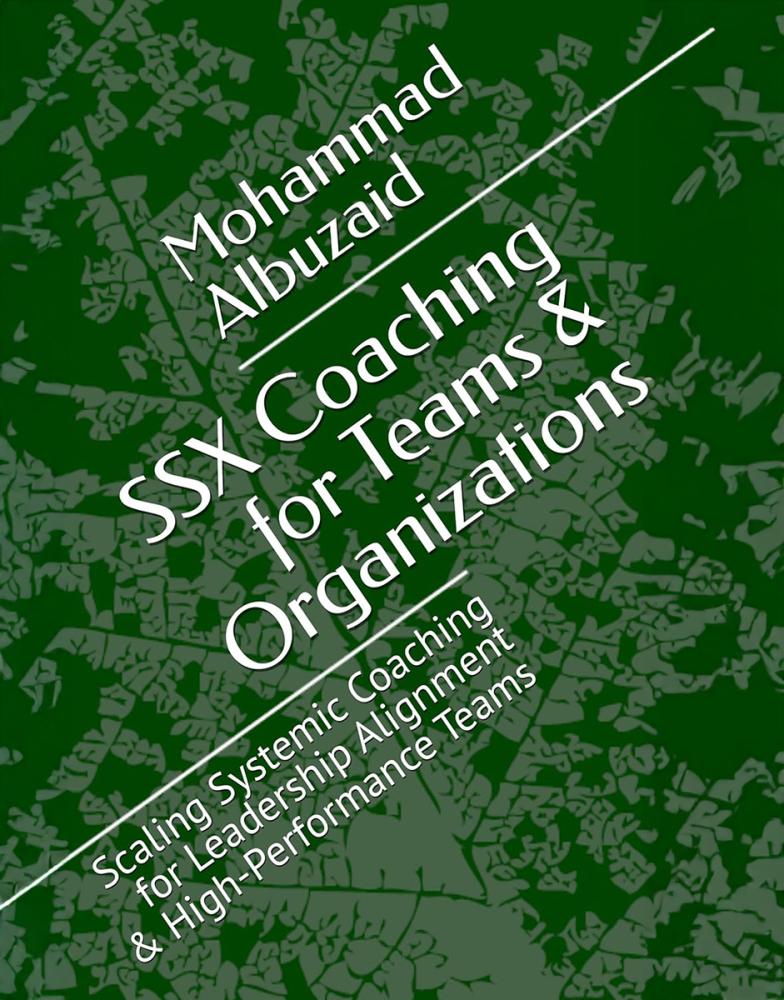SSX Coaching for Teams & Organizations – Summary
By Mohammad Albuzaid
Overview
This book is a comprehensive guide to systemic coaching for teams and organizations, expanding on the foundational principles introduced in SSX Coaching Fundamentals. It provides a structured approach for leaders, coaches, and HR professionals to enhance team performance, build coaching cultures, and drive organizational transformation.
Key Themes & Takeaways
1. Shifting from Individual to Team Coaching
- Traditional coaching focuses on individual leaders, but true organizational success depends on how well teams operate as a system.
- Coaching must address team dynamics, trust, collaboration, and alignment to unlock high performance.
- Case studies illustrate how systemic coaching has helped teams overcome dysfunctions, build trust, and improve decision-making.
2. Leading Teams Through Change & Complexity
- Change management is a major challenge for teams, and resistance is often structural, not personal.
- Systemic coaching helps teams build resilience, adaptability, and psychological safety.
- Strategies include conflict resolution, fostering psychological safety, and using coaching to support organizational transformation.
3. Developing a Coaching Culture in Organizations
- A coaching culture ensures that learning and growth are continuous, not just one-time interventions.
- Moving from one-on-one coaching to team coaching requires embedding coaching into leadership development and performance management.
- Sustainable coaching models create long-term impact by integrating coaching into daily operations and organizational strategy.
4. Measuring Success in Team & Organizational Coaching
- Traditional performance metrics often fail to capture the true impact of coaching.
- Systemic coaching success should be measured by team collaboration, leadership adaptability, and alignment with business goals.
- Feedback loops and continuous improvement cycles ensure that coaching efforts remain effective.
5. Scaling Systemic Coaching Across Organizations
- To maximize impact, coaching must scale from leadership teams to entire organizations.
- Cross-functional coaching breaks down silos, enhances agility, and improves business transformation efforts.
- Case studies highlight how multinational corporations and public sector organizations have used SSX Coaching to drive large-scale change.
Conclusion
Systemic coaching is more than just a tool for leadership development—it’s a transformative approach that reshapes organizations. By implementing scalable, structured coaching models, businesses can enhance collaboration, leadership, and agility, ensuring long-term success.
🚀 Next Steps
For those seeking deeper mastery, this book serves as a practical guide for coaches, consultants, and executives looking to embed systemic coaching into their organizations.
Contact & Further Learning
📌 Author: Eng. Mohammad Albuzaid
📌 Website: kanzae.com/mab
📌 LinkedIn: LinkedIn Profile
📌 Instagram: @malbuzaid
📌 Email: [email protected]
For certification details, coaching resources, and training programs, visit kanzae.com/mab 🚀

